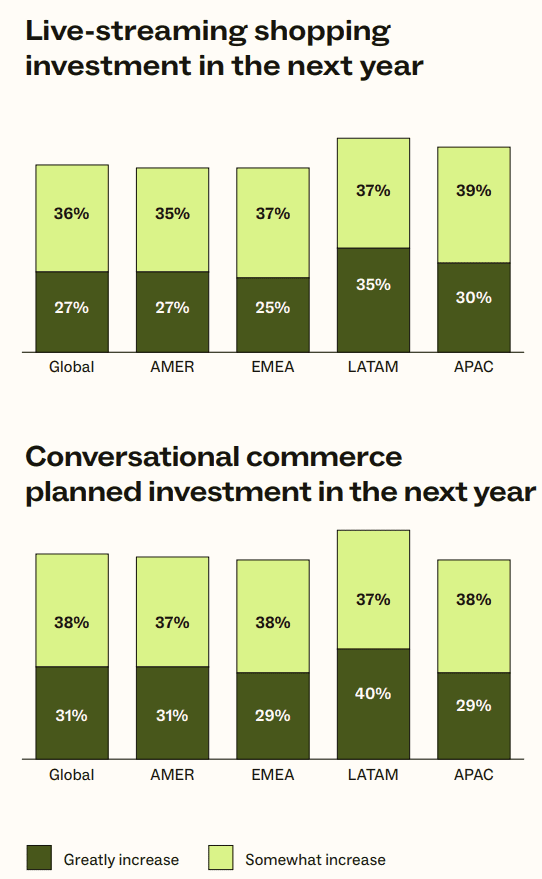In the realm of enhancing customer experience, a swift transformation is taking place, giving rise to what is now termed the era of intelligent customer experience (CX). This phase of intelligent CX involves the integration of AI, automation, and data analytics. It’s crucial to perceive these advancements not as standalone components but as interconnected elements working harmoniously across various dimensions of a business’s experiences. Leaders who are prepared to embrace these substantial shifts are poised for a promising future.
Zendesk has outlined key trends steering the era of intelligent CX, placing your business at the forefront of this evolution. These ten distinctive trends can be categorized into three areas: AI and intelligent experiences, data and trustworthy experiences, and next-gen and immersive experiences.
AI and intelligent experiences
Trend 1: Generative AI is set to accelerate the development of a more personalized and interactive customer journey.
While its potential spans various industries, in the realm of CX, generative AI will drive hyper-personalization, enabling businesses to provide more humanized interactions. Over the next two years, 70% of CX leaders plan to integrate generative AI into multiple touchpoints. Additionally, 59% of consumers anticipate a complete transformation in their interactions with companies, and among those who have firsthand experience with the technology, this expectation rises to 75%.
Trend 2: Chatbots are evolving into digital agents that have the capacity to do more.
CX leaders emphasize the importance of these new chatbots adopting a tone aligned with their company’s brand. 72% believe that bots should be an extension of the brand’s identity, reflecting its values and voice. Beyond maintaining brand consistency, the transformation of chatbots into digital agents extends to their improved efficiency in providing information swiftly and tailoring responses to better align with customers’ journeys. This enhancement will lead to stronger relationships with customers, a prospect envisioned by 67% of CX leaders.

Trend 3: Disconnect emerges between CX leaders and agents concerning everything related to AI.
While CX leaders widely embrace AI’s emergence and anticipate game-changing effects, there is a significant gap in agents’ confidence in utilizing this new technology successfully. Agents express both wariness and concern about AI’s implications for job security. Despite CX leaders claiming to have provided adequate training in generative AI tools (72%), more than half of agents assert they have received no training at all. Of those who did receive training, only 21% express satisfaction. Furthermore, a mere 34% of agents claim to understand their department’s AI strategy. This growing disparity underscores the need for bridging the gap between CX leaders and agents in embracing and utilizing AI effectively.
Trend 4: AI transparency and decision-making have now become the standard, not the exception.
AI transparency and decision-making have become standard practice rather than an exception. It is imperative for companies to provide clarity on the customer data they use, their commitment to preventing biases, and their methodology for evaluating AI performance against controls. 63% of consumers express concerns about potential bias and discrimination in AI algorithms and decision-making. To address these concerns, companies must be transparent about the inclusion and exclusion of data in their AI models to instill confidence in customers.
Data and trustworthy experiences
Trend 5: Businesses are intensively focused on promptly adjusting user experiences, placing increased emphasis on utilizing real-time data.
With the rise of AI, customer expectations have surged, demanding rapid responses and personalized information that convey a sense of familiarity. Despite 62% of CX leaders feeling behind in providing these instantaneous experiences, they have plans to bridge the gap by leveraging AI tools. Customers are aligning with these plans, with 51% expressing a preference for interacting with bots over humans for immediate service. This shift necessitates companies to enhance their bot capabilities through AI, particularly in capturing and analyzing sentiment and intent. A substantial 70% of organizations are actively investing in technologies and tools for automatic capture and analysis of intent signals.
Trend 6: CX leaders are driving data privacy as AI and personalization take on a greater role.
Customer concerns about data usage and protection from a tech-savvy criminal underworld have prompted CX leaders to prioritize data privacy. A resounding 83% of CX leaders identify data protection and cybersecurity as top priorities in their customer service strategies. Furthermore, 75% of CX leaders are actively collaborating with external partners or vendors to enhance customer data privacy in their CX operations.
Trend 7: Security is no longer an optional feature but seamlessly integrated throughout the customer journey.
While 74% of CX leaders claim to have detailed strategic plans to counteract digital deception and fraud in their CX operations, consumer perception tells a different story. Despite 83% of CX leaders believing that their customers trust their data security efforts, six in ten consumers believe companies are falling short. Prioritizing security throughout the customer experience is crucial, requiring resources and commitment. Failing to integrate robust security measures is a risky approach. However, with careful planning and dedication, implementing security measures can enhance the overall quality of the experience and build trust.
Next gen and immersive experiences
Trend 8: Live and immersive experiences are exerting a significant influence on the future of online shopping.
Consumer demand extends to conversational commerce, where customers can seamlessly purchase products within chat interactions. There is a growing inclination towards watching live-streamed sessions to seek shopping advice. Conversational commerce that enables purchases through chat or messaging, has swiftly become the standard in online shopping. However, consumers report the ability to make purchases directly within chat-based conversations with agents only 34% of the time. CX leaders acknowledge that failing to embrace these marketplace changes will result in losing valued customers to competitors.

Trend 9: Voice is becoming a more advanced role focused on handling complex and escalated issues.
Voice is assuming a more advanced role, particularly in handling complex and escalated issues, despite the prevalence of digital-first approaches in customer service. Customers anticipate voice to remain a viable channel, providing nuanced and tailored support. Among organizations, 71% primarily use digital channels for initial contact and leverage voice for resolving intricate customer issues or escalations. Notably, 41% of CX leaders express intentions to increase budgets for phone support in 2024, indicating a commitment to meeting customers where they are. Voice AI capabilities are set to play a pivotal role, as CX leaders who witness a substantial return on investment (ROI) from support tools are 62% more inclined to give priority to the improvement of their voice channel. This enhancement involves leveraging speech analytics, natural language processing, and voice AI technologies.
Trend 10: Predictive agent management tools are surpassing traditional methods.
A significant 79% of CX leaders plan to increase budgets for more strategic agent management tools. Among those already utilizing such tools, positive ROI has been evident. Beyond accurate staffing, these tools promise to enhance a company’s ability to respond promptly to customer needs. Recognizing the importance of strategic agent management, 79% of organizations are actively collaborating with external partners or vendors to facilitate this transformative shift.
Wrapping up: These 10 trends represent the next stage in the progression of customer experiences. Neglecting these advancements means conceding ground to competitors and witnessing the decline of trust and customer loyalty. Businesses that recognize these changes and plan accordingly will be able to secure their position at the forefront.
Source: Zendesk
Source: Top 10 trends to shape intelligent customer experience in 2024

